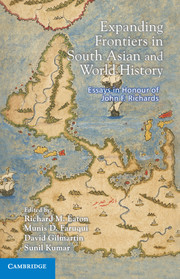Book contents
- Frontmatter
- Contents
- List of Contributors
- Foreword
- Introduction
- 1 At Empire's End: The Nizam, Hyderabad and Eighteenth-century India
- 2 The Ignored Elites: Turks, Mongols and a Persian Secretarial Class in the Early Delhi Sultanate
- 3 ‘Silk Road, Cotton Road or … Indo-Chinese Trade in Pre-European Times’
- 4 The Political Economy of Opium Smuggling in Early Nineteenth Century India: Leakage or Resistance?
- 5 Opium and the Company: Maritime Trade and Imperial Finances on Java, 1684–1796
- 6 The Mughals, the Sufi Shaikhs and the Formation of the Akbari Dispensation
- 7 Notes on Political Thought in Medieval and Early Modern South India
- 8 Becoming Turk the Rajput Way: Conversion and Identity in an Indian Warrior Narrative
- 9 Nature and Nurture on Imperial China's Frontiers
- 10 The Frontiers of Memory: What the Marathas Remembered of Vijayanagara
- 11 ‘Kiss My Foot,’ Said the King: Firearms, Diplomacy and the Battle for Raichur, 1520
- 12 Frontiers of Family Life: Early Modern Atlantic and Indian Ocean Worlds
- 13 Chinese Revenue Farms and Borders in Southeast Asia
- Publications
- Index
2 - The Ignored Elites: Turks, Mongols and a Persian Secretarial Class in the Early Delhi Sultanate
Published online by Cambridge University Press: 05 January 2014
- Frontmatter
- Contents
- List of Contributors
- Foreword
- Introduction
- 1 At Empire's End: The Nizam, Hyderabad and Eighteenth-century India
- 2 The Ignored Elites: Turks, Mongols and a Persian Secretarial Class in the Early Delhi Sultanate
- 3 ‘Silk Road, Cotton Road or … Indo-Chinese Trade in Pre-European Times’
- 4 The Political Economy of Opium Smuggling in Early Nineteenth Century India: Leakage or Resistance?
- 5 Opium and the Company: Maritime Trade and Imperial Finances on Java, 1684–1796
- 6 The Mughals, the Sufi Shaikhs and the Formation of the Akbari Dispensation
- 7 Notes on Political Thought in Medieval and Early Modern South India
- 8 Becoming Turk the Rajput Way: Conversion and Identity in an Indian Warrior Narrative
- 9 Nature and Nurture on Imperial China's Frontiers
- 10 The Frontiers of Memory: What the Marathas Remembered of Vijayanagara
- 11 ‘Kiss My Foot,’ Said the King: Firearms, Diplomacy and the Battle for Raichur, 1520
- 12 Frontiers of Family Life: Early Modern Atlantic and Indian Ocean Worlds
- 13 Chinese Revenue Farms and Borders in Southeast Asia
- Publications
- Index
Summary
INTRODUCING THE SULTANATE FRONTIER MILITARY COMMANDERS
Social and political formations in the Indus and Gangetic plains were not unduly troubled by political developments in the mountainous Hindu Kush or Karakorum regions in the north-west. These lands were too poor and fragmented to support large state systems and the pastoral inhabitants of the area indulged in relatively localized plundering expeditions into the plains. Although trade routes into Iran and Central Asia were more easily disturbed by the turbulent politics of the region, Afghanistan seized the attention of political regimes in north India only when the area became a part of larger geopolitical developments.
In the tenth through the twelfth centuries this happened when the Ghaznavid and Ghurid regimes attempted to sustain their control over eastern Iran by the revenues extracted from north India. The challenges posed by these developments were completely dwarfed by the Chinggisid invasions of the thirteenth centuries. The Mongols seized much of western Punjab and periodically threatened the Gangetic plains, destroying agriculture, displacing pastoralists and pillaging cities. Beyond the very real threat of Mongol depredations was the ‘great fear’ that gripped the land in the 1220s and after, when it seemed as if a holocaust of proportions already witnessed in eastern Iran, Transoxiana, and Afghanistan was awaiting north India.
- Type
- Chapter
- Information
- Expanding Frontiers in South Asian and World HistoryEssays in Honour of John F. Richards, pp. 39 - 71Publisher: Cambridge University PressPrint publication year: 2013

